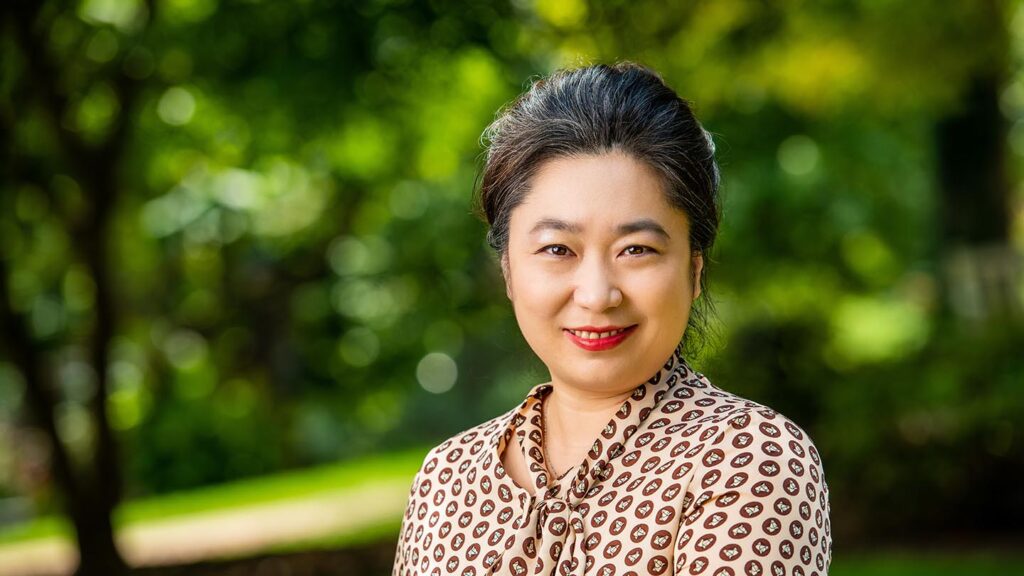Meet our new faculty: Xu Ma
 Xu Ma, assistant professor of religious studies, joins Lafayette after completing her master’s degree at Stanford and Ph.D. at the University of California, Irvine.
Xu Ma, assistant professor of religious studies, joins Lafayette after completing her master’s degree at Stanford and Ph.D. at the University of California, Irvine.
Area of study: “I specialize in late imperial Chinese popular religions and gender issues (roughly spanning from 16th through 19th centuries). My areas of interest include Asian religious traditions, gender studies, literature, textual culture and book history, cultural and space theories, etc. My dissertation, ‘Temple and Text: Re-imagining Social Spaces for Women in Late Imperial China,’ offers a new window into women’s spatial, social, and spiritual positioning in late imperial China by reconsidering women’s multifaceted interactions with temples/monastic spaces.”
Fall courses: Religions in World Cultures and Female Divinities in China
On the impact of COVID: “Fortunately, although the virus kept everyone physically/spatially apart, all my friends, colleagues, and students nonetheless stay more united and closer. We established many virtual academic groups to share our personal libraries and sources and support one another in terms of academic and pedagogical needs. It turned out that people in adverse and unpredictable situations would become much more courageous, resourceful, and creative in terms of navigating through and solving problems.
“Remote instruction can make students feel quite isolated and lonely, so we as teachers have to create sufficient presence in the process of students learning. Even though we’re online, I still love to talk to my students and want them to see me as a real person and not to think of the class as just some lines of words on the discussion board or in emails. So, I will be holding online office hours more flexibly and frequently. And I will share my personal media accounts like WeChat, WhatsApp, and Facebook to encourage them to reach out by whatever means they feel more comfortable.”
On fostering inclusivity: “I think the pandemic affords me a special opportunity to illustrate the permeating and persisting influences exerted by religious traditions on our modern cultural and social life. By introducing people’s different (sometimes even opposite) reactions and opinions to COVID-19, we will be able to encourage students to revisit the role of religious notions and practices in shaping our experience and expressions of global issues. It’s rewarding to integrate discussions about what’s happening in the world nowadays, and the effects, into our courses on traditions.
“In this trying and uncertain time, I see my role as a professor to be less that of an instructor than that of a facilitator, an ally to and resource for students as they embark on their own intellectual projects with more challenges. I am committed to creating inclusive classroom environments. I strive to learn about and be sensitive to students’ diverse backgrounds, interests, and career goals so as to create equitable and relatable environments for all students to flourish. I take seriously my mandate as a teacher to speak to each and every student in a way they find approachable, productive, and validating.”
My moment of zen: “I feel it was easier to achieve equanimity when working deadlines loomed large during the period of self-isolation. Somehow I feel like the virus to a certain degree motivated and facilitated me to complete my dissertation and Ph.D. degree in a timely manner. Perhaps this ‘blessing in disguise’ is what an ancient Chinese philosopher Laozi said—apparent disaster or loss could turn into or lead to good fortune and success.”
What I like about Easton: “This is my first time on the East Coast. I spent seven years in California after I came to the U.S. The constant sunny days in California can be super lovely and also dull. I enjoy very much the more humid and rainier summer here in Easton as it resembles very much my hometown back in China. I have missed so much the well-pronounced four seasons since I left home, and now I am thrilled to embrace the four seasons and feel like home again in Easton.”